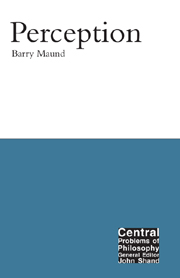
-
The digital format of this book is no longer available to purchase from Cambridge Core. Other formats may be available.
-
Select format
-
- Publisher:
- Acumen Publishing
- Publication date:
- 05 February 2013
- 30 April 2002
- ISBN:
- 9781844653409
- 9781902683591
- 9781902683607
- Dimensions:
- Weight & Pages:
- 00kg,
- Dimensions:
- Weight & Pages:
- 00kg,
- Subjects:
- Epistemology and Metaphysics, Philosophy
- Series:
- Central Problems of Philosophy
You may already have access via personal or institutional login- Subjects:
- Epistemology and Metaphysics, Philosophy
- Series:
- Central Problems of Philosophy
Book description
The philosophical issues raised by perception make it one of the central topics in the philosophical tradition. In this introduction to the philosophy of perception Barry Maund highlights the importance of a good theory of perception not only in an epistemological context but also in metaphysics and the philosophy of mind. The book centres on two fundamental and interrelated problems: whether perception is direct or indirect, and what is the best account that we can give of perceptual experiences. The author develops a framework that provides the means for making progress towards solving these problems and sets out a strategy for developing a correct philosophical theory of perception. Among the many ideas discussed are forms of natural realism, representationalism, the argument from illusion, the dual aspect of perceptual experiences (phenomenal character and intentional content), the representationalist or intentionalist theory of phenomenal character, conceptual and non-conceptual forms of content, and adverbialist accounts of perceptual experience. The author argues that most philosophical debates about the respective merits of direct and indirect realism are deeply flawed, and that it is possible to defend a hybrid theory of perceptual experience that has direct and indirect components.
Reviews
"A great contribution to the literature. An exceptionally good guide to those interested in getting a foothold on the metaphysical and mind aspects of perception."
Source: Philosophy in Review
Contents
Metrics
Full text views
Full text views help Loading metrics...
Loading metrics...
* Views captured on Cambridge Core between #date#. This data will be updated every 24 hours.
Usage data cannot currently be displayed.
Accessibility standard: Unknown
Why this information is here
This section outlines the accessibility features of this content - including support for screen readers, full keyboard navigation and high-contrast display options. This may not be relevant for you.
Accessibility Information
Accessibility compliance for the PDF of this book is currently unknown and may be updated in the future.


